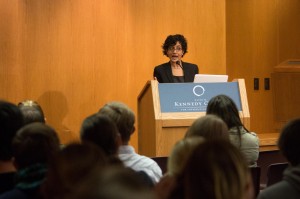
New York Times journalist Somini Sengupta discussed ISIS, ebola, global epidemics, government and warfare in her address to BYU on Thursday, October 30.
Sengupta recalled her experience in Liberia over 10 years ago while the country was at the peak of war. She stated that after thousands of deaths, closed schools and no medical supplies or food, the country was desperate for intervention.
“Embassy guards watched from behind fortified, glass-walled posts as the Liberians, many from a compound across the street that is owned by the embassy, howled, held their heads in their hands and clasped their noses as they put down 18 bodies, already smelling in the steamy heat,” Sengupta reported in her article in the New York Times.
Thirteen international peacekeepers stepped in to create a new government within Liberia. “Diplomacy had worked. The international community congratulated themselves and moved on,” said Sengupta.
But just after peace was “established,” there arose infection and disease. Nigerians were suffering from diarrhea, fever and sudden death. The vicious disease arrived 10 years ago, but it had not been named until it spread outside of third-world countries this year. The disease has been named Ebola.
There have been 13,000 cases and 5,000 dead mostly in Liberia, Sengupta reported. She said the U.N. was slow to react. “This showed how unprepared the world was,” Sengupta said.
Sengupta said that she recently received a note from her children’s school in New York City that addressed the concerns and precautions of Ebola to the community. The military council declared Ebola a threat to peace and security in September.
“Ebola is our problem now,” Sengupta stated.
Sengupta said the U.N. is “fundamentally an ensemble of nation states.” She reported that there were 51 countries apart of the U.N. in 1945, and now, after countries have become free, there are 193 member states.
Ebola is the latest crisis but not the only one that the U.N. has addressed. Sengupta recognized two other cases that matter a lot– Syria and Ukraine.
Over 200,000 people have died in the past ten years of war since the 2003 invasion in Syria. World powers have been unsuccessful in establishing peace. Sengupta claimed that the U.N. cared too much, especially Russia and The US.
Sengupta referred to the situation, “back to the bleakest days of the U.N. since the Cold War.” A Malasya airline crash killed 300 passengers instantly, American journalists have been beheaded and broadcasted online by ISIS, attempts to commit genocide threatening civilians to convert or be killed all form a new kind of threat to the world.
The war within Syria for the past 10 years is now our problem too. So should we all live in fear? Sengupta said no. She stated that living in fear would be a terrible mistake because it is not grounded in fact and is no way to live.
“We may be living in the most peaceful, prosperous and healthiest times in human history,” Sengupta stated according to Steven Pinker, a recognized author and psychologist.
Sengupta discussed how brutal the world has been in the past and reported that since World War II and the creation of the UN there have not been any wars between the big powers, resulting in fewer mass deaths.
“‘Deadly conflicts’– killing over 1,000 people, have declined by half since the 1990s,” Sengupta reported. She said that when we look back, the past seems less innocent and the future seems a little less to be fearful of.
Sengupta declared that ebola can have a surprising recovery rate, that countries have contained it in the past, and that ebola is not a new thing.
The spread of Ebola to America has enticed the U.N. to set up an emergency help mission to coordinate help treatment centers in Nigeria, raise money and knowledge and also encourage countries to do more and see it as our problem now.




